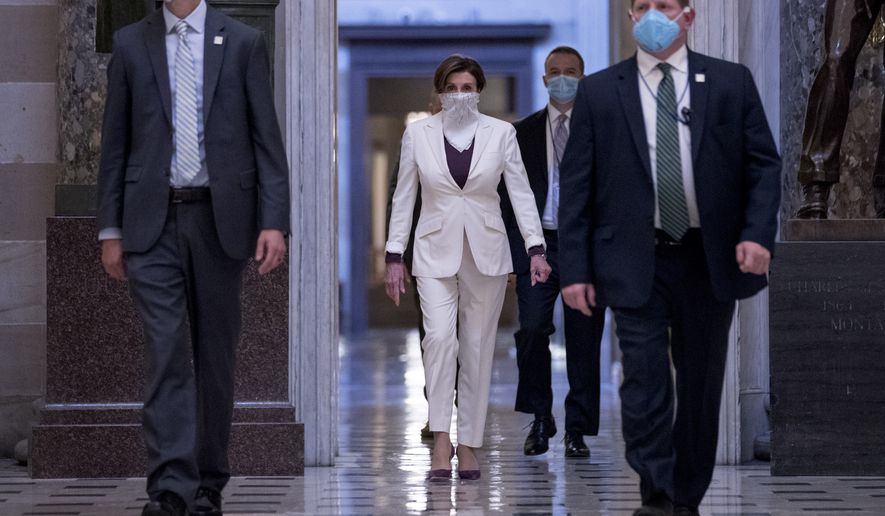Congress on Thursday approved a half-trillion-dollar infusion of cash for coronavirus stimulus efforts, rushing to rescue a program designed to keep workers on the payroll of small businesses as job losses pile up.
Another 4.4 million people filed for unemployment benefits last week, according to the numbers announced Thursday morning.
That is actually good news because it’s down from 5.2 million initial claims the previous week. All told, about 26 million Americans have filed for unemployment benefits over the past five weeks as COVID-19, the disease caused by the coronavirus, has slammed the economy.
Republicans said this week’s jobless claims report from the Labor Department could have been better if Congress had acted faster on the cash infusion to the Paycheck Protection Program, which Republicans tried to pass last week but which Democrats blocked until they added their own priorities.
In the end, the deal passed overwhelmingly, 388-5, after clearing the Senate in a voice vote Tuesday.
“Rome is burning. We can either put out the fire or watch our great nation go down in flames,” said Rep. Hakeem Jeffries of New York, chairman of the House Democratic Caucus. “This bill will help family-owned business, help women-owned business, minority-owned business, help small family farmers and help our hospitals and nursing homes.”
Most of the $484 billion measure, which President Trump said he will sign, will go toward replenishing money in the Paycheck Protection Program, which backs loans to small businesses so they can keep workers on their payrolls, preventing layoffs and unemployment.
Democrats insisted at least $60 billion be earmarked for minority businesses and others that may have trouble getting loans from commercial banks. The bill also includes $75 billion to boost hospitals and $25 billion to build more testing capacity.
The debate on the House floor was unlike anything lawmakers had seen before.
Doorkeepers limited entry to the chamber until lawmakers were scheduled to speak, to limit crowding and adhere to coronavirus social distancing guidelines.
When she rose to speak, Rep. Maxine Waters, California Democrat, announced to the chamber that her sister has COVID-19 and is “dying in a hospital in St. Louis.”
Staffers on the floor wore masks, as did many lawmakers. Some spoke through their masks, while others, such as House Speaker Nancy Pelosi, California Democrat, pulled down their masks to be heard clearly.
When it came time to vote, lawmakers were assigned alphabetically to groups with set times. A cleaning crew sanitized the chamber in between votes.
Voting against the bill were four Republicans — Reps. Andy Biggs of Arizona, Thomas Massie of Kentucky, Jody Hice of Georgia and Ken Buck of Colorado — and Rep. Alexandria Ocasio-Cortez, New York Democrat.
The bill was dubbed “phase four” of Congress’ coronavirus response. An initial $8.3 billion was approved on March 4, and a nearly $200 billion package two weeks later, followed quickly by phase three, a $2.2 trillion measure intended to prevent a total collapse of the economy.
A key part of that stimulus was the paycheck program. It proved so popular that its funding ran out within weeks. The Treasury Department begged for more, and Republicans who control the Senate rushed to add $250 billion.
Mrs. Pelosi said she supported that funding but insisted that it be connected to other items on her wish list. She and Treasury Secretary Steven T. Mnuchin negotiated, and the result, more than a week later, was the bill that cleared Thursday.
She bristled against accusations that she delayed the bill.
“Nothing could be further from the truth,” she said, saying Republicans were to blame for the holdup.
House Minority Leader Kevin McCarthy, California Republican, said Mrs. Pelosi’s defense was more political spin.
“The lady doth protest too much, me think,” he said, laying the 4.4 million new jobless claims directly at her feet.
Mrs. Pelosi said a phase five bill will be needed, with Congress sending money to states and localities that are facing massive budget gaps as their tax bases collapse.
She also will have to find a way to get lawmakers back to town.
Thursday’s vote was the first floor action in nearly a month, and lawmakers are slated to flee Washington again.
Across the Capitol, Senate Majority Leader Mitch McConnell, Kentucky Republican, has said he doesn’t see any more bills passing until Congress is back in full.
He also said this week that states and localities looking to the federal government for help have another option.
“I would certainly be in favor of allowing states to use the bankruptcy route,” Mr. McConnell told radio host Hugh Hewitt. “It saves some cities. And there’s no good reason for it not to be available. My guess is their first choice would be for the federal government to borrow money from future generations to send it down to them now so they don’t have to do that. That’s not something I’m going to be in favor of.”
Mrs. Pelosi said bankruptcy isn’t a viable answer for localities facing choices that include whether to pay or lay off firefighters and police officers.
• Stephen Dinan contributed to this report.
• Gabriella Muñoz can be reached at gmunoz@washingtontimes.com.
• David Sherfinski can be reached at dsherfinski@washingtontimes.com.




Please read our comment policy before commenting.